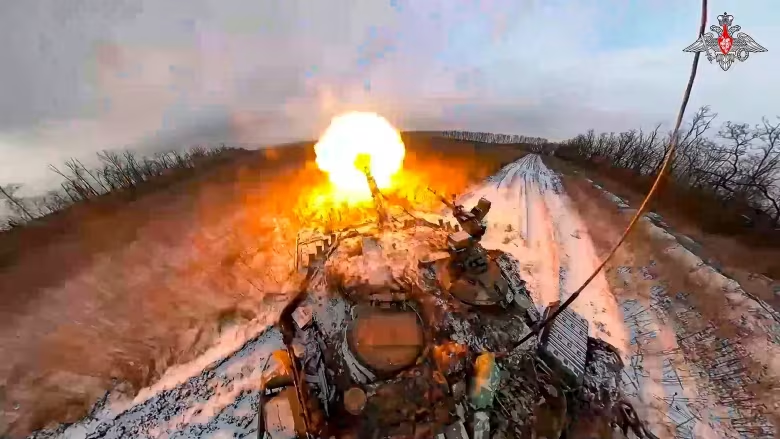
This image, captured from video and provided by the Russian Defense Ministry Press Service on Thursday, February 8, 2024, shows a Russian tank firing a cannon at an undisclosed site in Ukraine. (Image source: Russian Defense Ministry Press Service via AP)
In recent times, warnings have echoed about the significance of Russia's advance into Ukraine. Yet, amidst the political rhetoric, it appears we've finally reached a true turning point this week. Events in Kyiv, Moscow, Washington, and Ottawa have converged, signalling a shift in the trajectory of history. But as the narrative unfolds, uncertainty looms over the direction we're headed.
Drawing parallels to Winston Churchill's pivotal moment after the Battle of El-Alamein, the current situation mirrors a crucial juncture in a larger conflict. Churchill's words resonate: "Now this is not the end. It is not even the beginning of the end. But it is, perhaps, the end of the beginning." Similarly, we stand on the precipice of change, though the path forward remains unclear.
The week's developments paint a complex picture. Ukrainian President Zelenskyy's decision to replace his top military commander, coupled with the unravelling of the U.S. aid package and political deadlock in Washington, underscores the gravity of the situation. Meanwhile, public sentiment in Canada reflects a shifting stance on support for Ukraine's cause.
Experts emphasize the significance of these events, particularly the political stalemate in the U.S. Congress. While military changes in Ukraine hold weight, the direction of the war hinges more on geopolitical dynamics. Amidst this turmoil, the European Union's commitment to aid offers a glimmer of hope, albeit amidst prolonged uncertainty and escalating suffering.
As new leadership takes the reins in Kyiv, intentions to fortify the front lines and leverage technology signal renewed vigour in the fight. However, questions linger over the implications of these shifts and their impact on the broader conflict.
In Canada, a noticeable shift in public opinion raises concerns about wavering support for Ukraine, echoing trends observed in U.S. politics. Yet, distinctions remain, shaped by the influence of Ukrainian diaspora communities.
Against this backdrop, Vladimir Putin's recent remarks during an interview with Tucker Carlson have sparked intense scrutiny. His revisionist narrative concerning World War II history raises alarms, suggesting a willingness to rewrite historical truths.
Amidst these geopolitical manoeuvres, a stark warning emerges: a Russian victory in Ukraine could spell the annihilation of Ukrainian nationhood. The implications are dire, signalling a pivotal moment not just for Ukraine, but for the broader geopolitical landscape.















